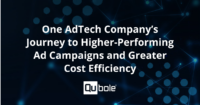If ever a problem and a solution were made for each other, it’s autonomous driving and Artificial Intelligence (AI). Turning the dream of driverless cars into reality means equipping every vehicle with a wealth of sensors and analytical technology. That technology must be able to gather vast amounts of real-time road and in-car data, process it instantly, and make the right driving decisions based on highly advanced algorithms — AI at its finest.
The risks and rewards in this area are huge. Removing humans from behind the wheel could save hundreds of thousands of lives a year: nearly 1.25 million people worldwide are killed in road crashes annually. The US Government estimates that over 90 percent of crashes are caused by human error — such as driving too fast, misjudging other drivers’ behaviors, or driving poorly due to alcohol impairment, distraction, or fatigue.
But if the new autonomous technology fails, lives are at stake. That’s why research organizations like the RAND Corporation estimate driverless vehicles may need billions of miles of autonomous driving data to prove their reliability, potentially putting the rollout of fully self-driving cars years or even decades away.
It’s a mistake to see AI-based vehicle safety as all-or-nothing. As every driver knows, plenty of car manufacturers are already including advanced safety technology to support the human driver — such as forward-collision warning, auto-braking systems, and more — that are decreasing accident numbers.
Using Actionable AI-Based Insights to Save Lives
This is where AI companies like Silicon Valley-based Nauto come into their own. Nauto has developed an intelligent driver safety system that combines dual-facing cameras, computer vision, deep learning–based technologies, and proprietary algorithms to gauge how drivers interact with the vehicle and the road ahead.
From this, Nauto provides actionable insights that alert drivers when risky behavior is present. In particular, the system enables commercial car fleet managers to identify and coach high-risk drivers to reduce distracted driving, prevent collisions, and save lives. Even more importantly, Nauto’s AI-powered data platform offers key insights that can be used to model and train autonomous systems.
To achieve this, Nauto faced its own tech challenge: finding the right back-end system to process and make petabyte-scale data available for machine learning. The company chose the Qubole data platform to meet its data processing and availability needs.
Nauto has to integrate as much real-time driver, vehicle, and road information as possible. They must rapidly use this data to develop new algorithms and product feature sets to serve customers. The scale is significant because Nauto is in over 250 fleets worldwide. Their platform detects safety events ranging from hard-braking collisions to distracted driving and tracks information related to those events.
Managing Critical Driver Data with Qubole
To manage this data volume, Nauto has migrated to Qubole’s scalable, cloud-based data platform and plans to complete its global rollout of Qubole during 2019. Qubole is accessed by Nauto’s team of DevOps and data engineers, as well as business users. Nauto uses tools such as Apache Spark, Presto, and Amazon SageMaker to cleanse and prepare datasets, run analytics, and build and deploy machine learning models.
Qubole has helped Nauto’s data scientists become more productive. Previously, engineers spent many hours conducting data cleanup, maintenance, and management, including manual spreadsheet-based data processing to tune algorithms. Qubole has largely automated these processes and cut the time required to provide actionable insights from one to two weeks to two to three days — a five-fold improvement. This means Nauto’s data scientists can focus on ‘productionalizing’ algorithms and providing customers with valuable insights.
Using Presto on Qubole, Nauto’s engineers can also productionize algorithms much faster by testing them against all of its disparate customer data assets, rather than a subset. Qubole’s holistic view of data means products are deployed faster, and with better quality. Nauto’s time to develop new products has been cut from one year to two to three months.
As Lei Pan, Nauto’s Director of Engineering for their Cloud Infrastructure, said: “Qubole makes our data engineering team much more productive. Our data engineering team moved away from doing routine maintenance and management work to focusing on serving our customers’ needs and road safety.”
The Future of Autonomous Driving
Nauto has fully exploited the opportunities offered by AI to combat distracted driving and other risky behavior. It’s a deadly problem: nearly 3,500 people in the US were killed in crashes involving distracted drivers in 2016 alone.
But as Nauto’s VP of Strategy & Business Operations Jennifer Haroon pointed out last year, Nauto’s focus on analyzing and improving how drivers behave doesn’t just have an immediate effect on car safety. Understanding how all types of drivers — good and bad — behave behind the wheel is a big part of developing safe, effective autonomous vehicles. This is especially important when it comes to unexpected or nuanced situations, like when a driver encounters a road detour or approaches an urban intersection where navigation depends on driver-to-driver eye contact.
Nauto is working with autonomous system developers and other partners to build and share knowledge (anonymized and aggregated) of how the best drivers operate. Powered by Qubole, Nauto’s AI systems are providing this and other high-quality In tdata to train future autonomous driving systems and improve road safety.
Read the full case study to learn more about how Nauto’s team uses Qubole.



